Exclusive: Nigerian Christians, Forgotten by the West, Face Christmas Under the Shadow of Jihadist Genocide
Christians in Nigeria will celebrate Christmas this year facing a relentless onslaught of jihadist terrorism seeking to eliminate them from the country, experts told Breitbart News, with little support from their government.
In the northeast, Nigerian Christians have endured decades of attacks by Boko Haram, the Islamic State-affiliated terrorist organization committed to killing Christians and forcing young girls into sex slavery “marriages” with their fighters. In the central Middle Belt, jihadists belonging to the majority-Muslim Fulani ethnic group regularly conduct raids on Christian communities, burning down entire villages and occupying land historically populated by Christian majorities. The objective in both cases is the genocide of Nigerian Christians and the establishment of a sharia “caliphate” system.
International Christian Concern named Nigeria the world’s top oppressor of Christians in its 2023 report — the world’s most dangerous place to be a Christian — as a result of the “20-year genocide against Christians” there by Boko Haram, the Fulani, and other jihadist elements.
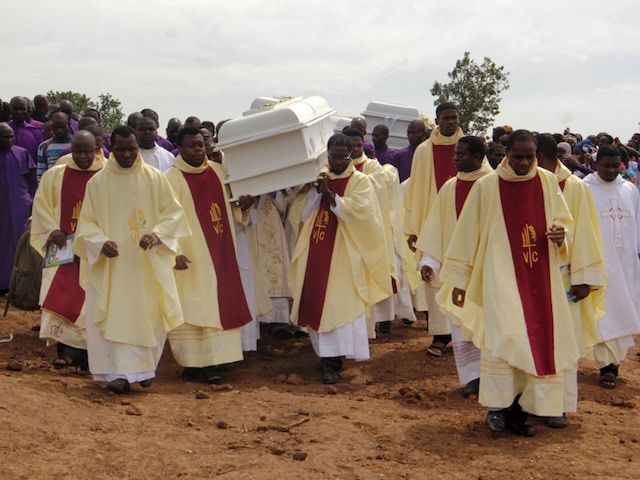
Clergymen carry white coffins containing the bodies of priests allegedly killed by Fulani herdsmen, for burial at Ayati-Ikpayongo in Gwer East district of Benue State, north-central Nigeria on May 22, 2018. (EMMY IBU/AFP via Getty Images)
“You have to distinguish between the tribe and the group of extremists within that category. With that understanding, the Fulani feel as though all of a certain territory belongs to them by right, by history, and you might say they view it as their God-given caliphate,” David Curry, the president and CEO of Global Christian Relief, told Breitbart News, “because they have a theology. This is not just a tribal issue, this is not just a land issue, and it’s not a climate issue, as is sometimes stated … No, this is, they view this as their God-given right.”
The persecution has plagued the country for years with little or no intervention from the government and, unlike in many other parts of the world where Christians face genocidal action, even though they make up a significant percentage of the population. While a slight plurality of Nigerians are Muslim, about 45 percent of the country belongs to some form of Christian church.
It largely occurs in the form of raids of Christian communities, in both north and central Nigeria, by jihadist attackers who kill and abduct as many Christians as possible — then take their homes and settle in their land.
“Last Christmas, essentially, there was a spate of attacks where something like 100 plus people were attacked, unfortunately the numbers are always inexact,” Edward Clancy, the director of outreach for the Catholic charity Aid to the Church in Need, told Breitbart News in a recent interview, naming the Middle Belt state of Benue as a particularly troubling hotspot of genocidal violence.
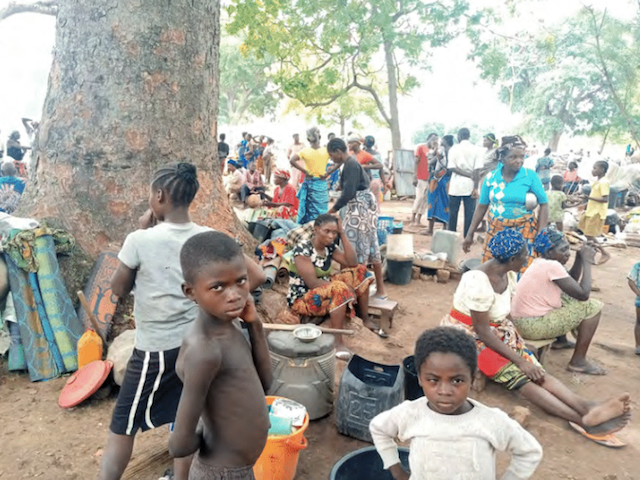
The Daudu IDP camp in Benue state, Nigeria (Courtesy of the Catholic Diocese of Makurdi Foundation for Justice, Development, & Peace)
“There’s, I believe, like 3 and a half to 4 million people in the state – and like 2 million plus, over 2 million are displaced,” he explained. “So it is not a good place to be on the outskirts. For example, the Diocese of Makurdi, they’ve lost 14 parishes.”
“Now 14 parishes — people in North America we hear about parishes merging, closing, things like that,” he continued. “This is a place in Nigeria where first of all a parish is not just one building, it’s oftentimes two, three, four, even a dozen buildings because it’s such a large area that a parish can represent 10 or 12 places of worship. So the diocese has lost 14 of these parishes and when we say lost, we mean like lost territory, there are Christians being forced out so there are no more residents there.”
“In one four-month span this year, more than 50 separate attacks killed over 500 Christians. Not a week goes by that Christians aren’t brutally kidnapped, tortured, and killed in the Middle Belt,” Jeff King, president of International Christian Concern (ICC), explained to Breitbart News this week. “The adoption of Sharia criminal law in 12 northern states has contributed to the ongoing persecution of Christians in the region.”
These descriptions of Benue are consistent with that given to Breitbart News in July by Father Remigius Ihyula, a university chaplain and emergency relief coordinator in the Diocese of Makurdi.
“These killings have been consistent. We have documented atrocities that have risen to the level of genocide against our people,” Father Ihyula told Breitbart News. “People, women and children, are killed on a daily basis. They are butchered, they have been driven from their homes, some have been living in camps for about ten years. They cannot go back to their homes.”
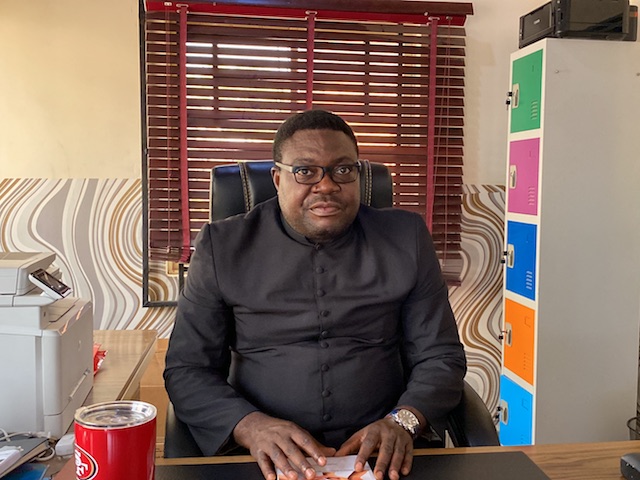
Father Remigius Ihyula of Benue State, Nigeria (Courtesy of the Catholic Diocese of Makurdi Foundation for Justice, Development, & Peace)
In northeast Nigeria — particularly in Borno state, the birthplace of Boko Haram, Christians face similar routine abductions, mass killings, bombings, and other attacks.
Curry of Global Christian Relief lamented in a recent conversation with Breitbart News that the new Nigerian government offered “a lot of lip service,” but no significant action to protect Christian populations. Having recently returned from northeast Nigeria, Curry said camps of internally displaced Christians — whose homes had been destroyed by jihadists — were largely left with no state protection.
“So the camps that I visited, none of them were protected. They were all vulnerable. They remain vulnerable, and the government seems to be doing little to stop the incursion of Boko Haram,” he explained. “Now, at one point, I was 15 minutes away, I was at a camp that was 15 minutes from a Boko Haram headquarters and the government knows they’re there. They know what they’ve done, and they allow them to remain. It’s outrageous.”
“So in this case, it could be that the regional leaders, unless there is an imminent danger to the general population, are not going to care if these Christians are attacked,” Curry said. “That sounds outrageous except when you see it firsthand, you can’t imagine why they don’t have protection around these camps where Christians have already been traumatized and also why they’re not policing the area.”
“They don’t have any helicopters on site to observe the movements of Boko Haram, who clearly exist 15 minutes from their camp,” he added.
Politicians at the national level often do not need to appeal to Christian voting blocs to stay in power and ignore their concerns entirely.
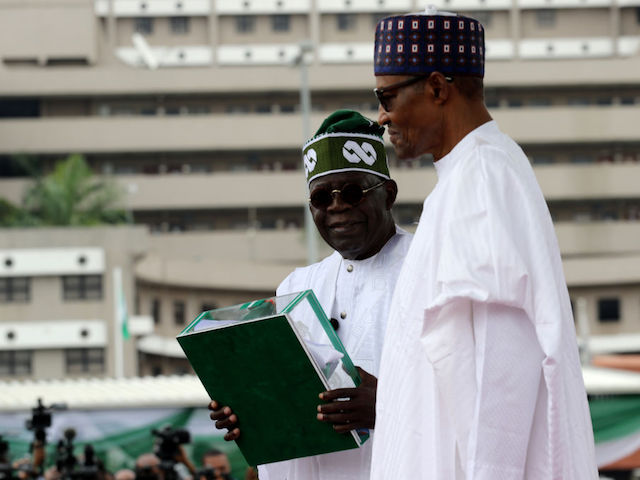
Nigeria President-elect Bola Ahmed Tinubu (L) arrives to attend a swearing-in ceremony at Eagle Square venue in the capital, Abuja, Nigeria on May 29, 2023. Former President Muhammadu Buhari (R) was also present at the ceremony. (Photo by Emmanuel Osodi/Anadolu Agency via Getty Images)
Former President Muhammadu Buhari, an ethnic Fulani Muslim who previously ruled as a military dictator, claimed in 2015 that Nigeria had “won the war” against Boko Haram and largely refused to acknowledge its existence in his eight years in power. His successor, fellow Muslim Bola Tinubu, broke with the tacit tradition of choosing a Christian vice presidential running mate and has not made any major moves to curtail genocidal activity against Christians in the country since taking office this year.
“The Nigerian government cannot be trusted on this subject,” Curry told Breitbart News. “Either their political alliances or moral framework has not allowed them to really go after these terrorists. … I don’t know whether it’s political alliances or just moral bankruptcy but the government is not protecting these Christians in these regions in the north.”
“Fundamentalist Muslims are in control of all the security organs of State including the police, the military, and intel agencies,” King, of ICC, said. “Fundamentalist Muslim actors embedded in the security apparatus of the Nigerian State in Nigeria have aided and abetted the Muslim Fulani’s slow-moving anti-Christian genocide and/or jihad for two decades now.”
King was nonetheless slightly more positive towards Tinubu, expressing a “glimmer of hope” in his administration.
“The new president has a Christian wife and has appointed several Christian heads of state. The president has also begun implementing increased military efforts against Fulani militants,” he said, “and has disappointed the extreme Islamic north, which has been facing economic challenges since his appointment.”
Clancy, of Aid to the Church in Need, lamented that the lack of improvement, “just based on that alone,” makes for a worse situation for Christians “because this will have a cumulative effect.”
“It’s worse because this will have a cumulative effect of year after year after year of wearing people down, destroying communities, making these little villages on the outskirts of states or not so close to the cities become devoid of any Christian presence,” he explained. “Up in Maiduguri, which is up in the northeast in Borno, which is the birthplace of Boko Haram. Maiduguri is essentially the Christian center of a very Muslim area of the country.”
“And there, there are neighbors, communities in that region. And again, Christians have left and you have this area where it might be a mix of Christians and Muslims, farmers, living near each other in relatively in peace,” he continued, “and now you have these Christian families that can’t even go to their farms because it’s not safe and if they do go to their farms and do any farming, they can’t go to the markets because the markets are not safe.”
“These areas could literally become devoid of Christians,” he warned.
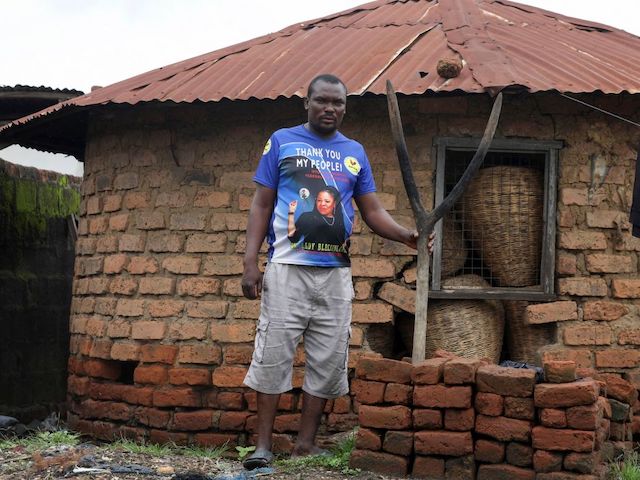
Solomon Acharga, a yam farmer in Benue looks on beside his empty farm storehouse at Northbank, Benue State, Nigeria, on August 12, 2021, due to persecution of Christian farmers by majority Fulani jihadists in the Middle Belt. (KOLA SULAIMON/AFP via Getty Images)
The threats have yet to succeed in eliminating Christianity completely, however, and Nigerians will continue to celebrate in the face of threats, the experts agreed.
“In the areas I was at, there is a strong population, if not the majority, of Christians and they’re going to celebrate Christmas,” Curry said, “but they’re going to do it in the posture of vulnerability because they know at any minute they could be attacked for their faith.”
“And certainly Christmas for many persecuted believers is something that they have to sort of practice and celebrate underground. But in Nigeria, by and large, they will celebrate in their homes, but it won’t necessarily be underground,” he added.
“The amazing thing is that Nigerians in Nigeria will celebrate Christmas with all of this going on,” Clancy concurred, “with the attacks that happened in Pentecost last year and then the attacks that happened earlier this year around Christmas … they still continue.”
“They still continue doing their jobs, filling their vocations, living their Christian lives, and the churches for the most part will be filled and they will be very joyful and they will celebrate,” he noted. “And for us in the West, we have to look at that not only as joy in the face of persecution and suffering but also the bravery, the fact that they are in a sense undaunted by what we would think, ‘ok I’m leaving.’”





Comments are closed.